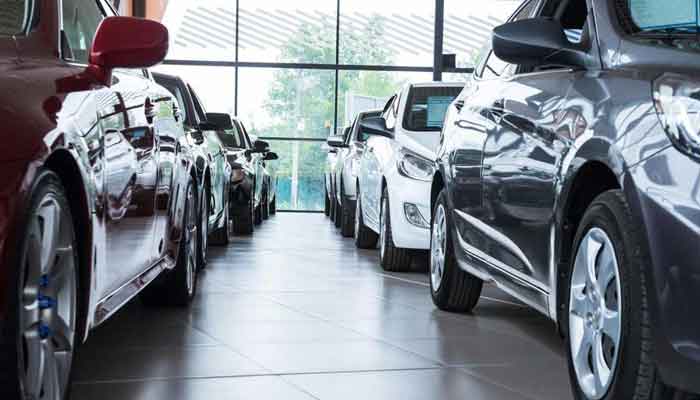Dissecting govt’s new auto policy 2021-26
Pakistan’s auto industry now has capacity to make 418,000 cars annually
KARACHI: Government’s previous auto policy – Auto Development Policy 2016-21 – brought many new entrants to the market that assembled different brands locally, such as Kia Sportage, Hyundai Tucson, Changan Alsvin and MG-HS, but none broke the dominance of Toyota, Honda and Suzuki.
This time the government was betting on scale production. Give car companies incentive to produce more and localise so they achieve economies of scale.
“We need a car model with a 100,000 units annual output,” said Engineering Board (EDB) Chairman Almas Hyder. “This will help achieve higher localisation, and may lead to localised engines as well.”
Pakistan’s auto industry now has capacity to make 418,000 cars annually. Reaching a milestone of selling 500,000 would help localise more. “Next year, the industry is targeting to sell 300,000 cars,” he added.
The new policy, Automotive Industry Development and Export Plan 2021-26, intended to give incentives through reduction in duties and taxes especially for cars below 1000cc. Moreover, the policy also looks to pave the way for manufacturing of hybrid cars and electric vehicles.
“Last time we brought in competition and investment. Policy for 2016-21 paved the way for 55 new vehicles in the country, many of which have already come and few will soon enter Pakistan’s auto fray,” Hyder said.
The chairman of the EDB, which regulates auto and mobile phone industries, said this time the target was to boost local vendor industry (manufacturing of parts), increase localisation, minimise auto imports, start exports and also reduce use of fossil fuel.
Under the policy, sales tax has been reduced to 12.5 percent from 17 percent for the cars below 1000cc. However, in the supplementary budget approved by the cabinet on Thursday, government reduced the engine size from 1000cc to 850cc.
Custom duty on import of parts already localised in the country has been reduced to 30 percent from 45 percent. For non-localised parts, the duties are halved to 15 percent.
For tractors of new make or new model, custom duty on localised parts was reduced for three years from 35 to 15 percent from manufacturing date or up to June 30, 2026, whichever comes first.
Similarly, custom duty on localised parts for two-wheelers exceeding 125cc and three-wheelers exceeding 200cc, was slashed to 30 percent from 46 percent. On non-localised parts, custom duty has been reduced to 15 percent from 30 percent. Federal excise duty (FED) on all locally manufactured vehicles has been reduced by 2.5 percent.
In an effort to curb on-money issue, taxes ranging from Rs50,000 and Rs200,000 have been imposed depending on engine power. Tax would apply in case booking of the vehicle was made by one person and registration was in the name of another.
Moreover, auto companies would be required to pay KIBOR plus 3 percent interest on initial down payment in case vehicle delivery was delayed beyond 60 days.
Hyder said that localisation would help industry create jobs and reduce the import bill. It would be mandatory for auto companies to export at least 10 percent of what they import to manufacture their vehicles in the first five years (till 2026).
The second focus of the policy was to reduce the industry’s carbon footprint by promoting electric vehicles and hybrid cars.
“Average mileage of a car in Pakistan is around 10 to 12km/litre of fuel. We are aiming to increase that mileage to 24 to 25km/litre by introducing electric vehicles and hybrid cars,” he said.
Sales tax for locally made electric vehicles with a battery less than 50kwh has been reduced to one percent from 17 percent. The policy allows importing completely built unit (CBUs) of EVs for one year at reduced custom duty of 10 percent instead of 25 percent. Custom duty on EV specific parts has been reduced to 1 percent from 30 percent.
Plugged-in hybrid EV specific parts can be imported with reduced custom duty of three percent instead of 30 percent. Hybrid EVs’ specific parts can be imported with reduced custom duty of four percent instead of 30 percent.
On Thursday, however sales tax on imported EVs was raised from 5 percent to 17 percent in the supplementary budget.
Among businesspersons who have shown interest in electric cars business have cried foul over government’s inclusion of hybrid cars in the policy saying it has made EV business unviable.
Hyder said the lack of charging infrastructure in the country would not allow wholesome penetration of electric cars in the country. But same was the not the case with hybrid cars.
Hybrid cars use 30 percent lesser fuel as compared to fossil fuel vehicles, which meant penetration of hybrid cars would reduce fuel consumption in the country.
Indus Motors Company, which assembles and sells Toyota cars, has already announced its plans to invest $100 million to setup local production facilities for hybrid cars and expects the project to come online in three years.
“Putting up charging infrastructure in the country is an expensive venture, and the government won’t be able to that,” he said. “It would take around $40 to $50 billion to have that charging infrastructure in the country to pave the way for significant EV penetration. Government doesn’t have that much money.”
Moreover, he added that there were very few countries in the world where there was recognisable EV penetration such as Finland or Norway.
Pakistan is a follower of technology and rarely a first mover. “Pakistan will phase out fossil fuel vehicles after they phase out around the world. And only then will we make EVs,” he explained.
He also suggested that EVs could be used on fixed routes with charging stations at the beginning and end of the route. “Big vehicles consume more fuel and providing charging infrastructure to them is comparatively easier,” he said.
Use of EVs could help reduce the oil import bill as well as air pollution.
Prime Minister Imran Khan has also set an EV penetration target where 30 percent of the traffic would be electrified by 2030. But according to Hyder, vision 2030 does not include hybrid cars and it was only about penetration of EVs. “The target is tough, but achievable.”
Hyder said the policy did not reduce tax on imported electric bikes because much of the bike parts were already localised and there were companies which were already manufacturing electric bikes.
-
 Why Nicole Kidman 'not Rushing' Into Love After Split From Keith Urban?
Why Nicole Kidman 'not Rushing' Into Love After Split From Keith Urban? -
 Benny Blanco's Dirty Feet In Debut Podcast Divide The Internet
Benny Blanco's Dirty Feet In Debut Podcast Divide The Internet -
 Jeffrey Epstein Blamed King Charles As Andrew Left Trade Enjoy Job
Jeffrey Epstein Blamed King Charles As Andrew Left Trade Enjoy Job -
 King Charles Asked To Lean On Princess Anne To Avoid ‘media Circus’
King Charles Asked To Lean On Princess Anne To Avoid ‘media Circus’ -
 Passenger Wins £10,000 Payout From Heathrow Airport After 100 Ml Liquids Dispute
Passenger Wins £10,000 Payout From Heathrow Airport After 100 Ml Liquids Dispute -
 Eric Dane's Costar Under Fire For Hurling Accusations At Him After His Death
Eric Dane's Costar Under Fire For Hurling Accusations At Him After His Death -
 Queen Camilla Greets The Paddington Bear At BBC’s 500 Words Grand Final
Queen Camilla Greets The Paddington Bear At BBC’s 500 Words Grand Final -
 Chinese Astronauts Finally Reveal Why Spacecraft Left Them ‘stranded’ For 437 Days In Space
Chinese Astronauts Finally Reveal Why Spacecraft Left Them ‘stranded’ For 437 Days In Space -
 Sinitta Makes Shock Admission About Marriage To Andy Willner Post Simon Cowell Heartbreak
Sinitta Makes Shock Admission About Marriage To Andy Willner Post Simon Cowell Heartbreak -
 Bill Gates Calls Ties To Jeffrey Epstein 'huge Mistake,' Reveals Past 'affairs'
Bill Gates Calls Ties To Jeffrey Epstein 'huge Mistake,' Reveals Past 'affairs' -
 Switzerland Announces One-time Compensation For Swiss Bar Fire Victims
Switzerland Announces One-time Compensation For Swiss Bar Fire Victims -
 Ryan Coogler Shares Thoughts About Building Community Of Actors Amid 'Sinners' Success
Ryan Coogler Shares Thoughts About Building Community Of Actors Amid 'Sinners' Success -
 Heidi Klum Gushes Over Diplo Collab 'Red Eye' Despite DJ Falling Asleep During Video
Heidi Klum Gushes Over Diplo Collab 'Red Eye' Despite DJ Falling Asleep During Video -
 Israel Behind Majority Of Journalist Deaths Worldwide, Watchdog Claims
Israel Behind Majority Of Journalist Deaths Worldwide, Watchdog Claims -
 'It Would Become A Circus' : Inside Jane's Turmoil For 'little Sister' Fergie Whose Hidden From The World
'It Would Become A Circus' : Inside Jane's Turmoil For 'little Sister' Fergie Whose Hidden From The World -
 Inside Cardi B's Real Feelings Related To Stefon Diggs Split Post One Year Of Romance
Inside Cardi B's Real Feelings Related To Stefon Diggs Split Post One Year Of Romance




